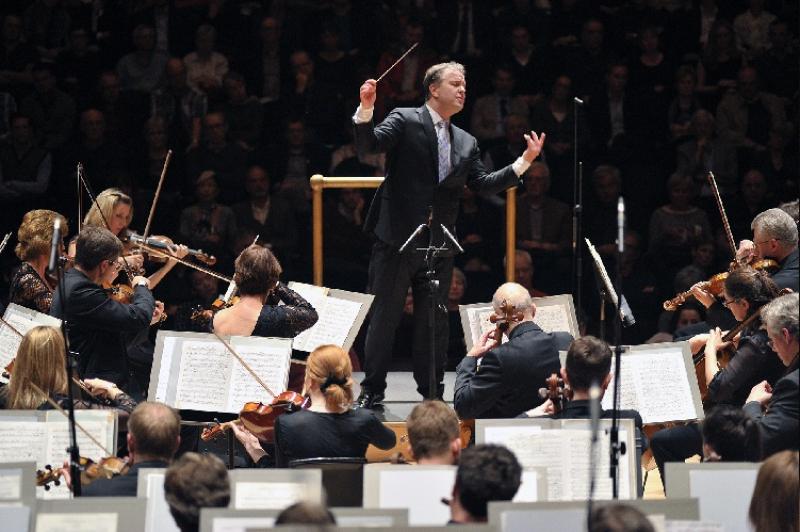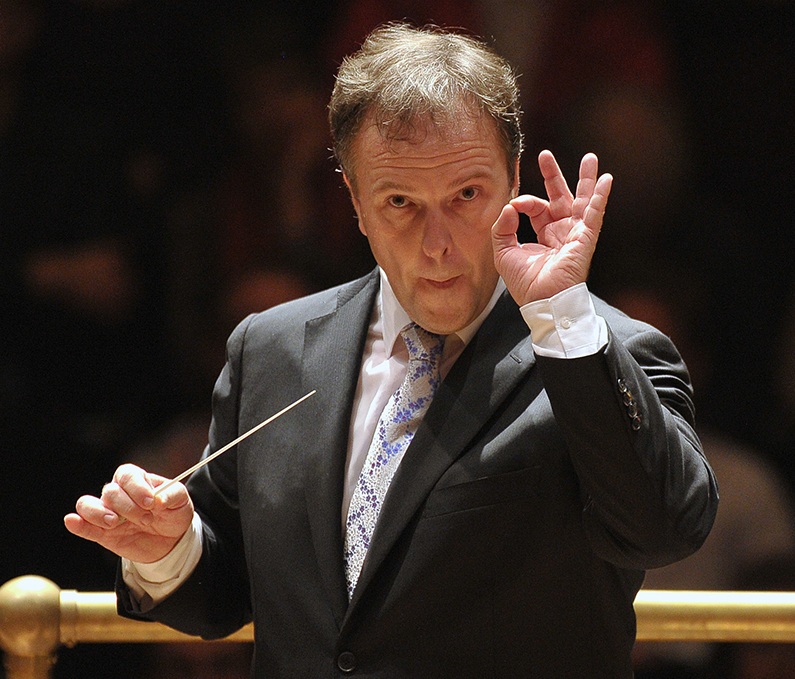Mustonen, Nakariakov, BBCSO, Oramo, Barbican | reviews, news & interviews
Mustonen, Nakariakov, BBCSO, Oramo, Barbican
Mustonen, Nakariakov, BBCSO, Oramo, Barbican
New chief conductor sets out his stall with an orchestra on impressive form

This was Sakari Oramo's first concert with the BBC Symphony Orchestra since taking over as chief conductor. Of course he knows the orchestra well already, but it was important to make this a good ’un, and so it was.
It opened with the world premiere of a 20-minute work by French composer Tristan Murail, with the double title Reflections/Reflets. As the title perhaps suggests it offered an evocative, colouristic sound world. The first half, "Spleen", dealt in bells, swells and waves rising out of a murky brass and low string background. The second, "High Voltage", featured slow glissandi, spiccato bowing, trills and fast runs up and down the chromatic scale – a seasonal firework display. As what is essentially a fairly static, sculptural piece, however, there was a lack of dramatic momentum or narrative arc, so it was hard to get swept up by it on first hearing. It was more than broad-brush impressionism though, with some finely wrought sonorities and certainly skilfulorchestration.
 There followed Shostakovich’s Concerto for Piano, Trumpet and Strings, with Olli Mustonen and Sergei Nakariakov as the soloists. The BBCSO’s string ensemble was here laid bare and impressed under Oramo’s deft and understated control. Mustonen’s articulation of the impish and disjointed piano lines was often idiosyncratic but always enjoyable and with a great sense of phrase. Nakariakov’s silky tone could have perhaps done with a bit of hamming up at times, with his interjections being a little too polite considering Mustonen’s more bumptious approach. When the trumpet was allowed to sing alone, however, the unshowy lyricism was very captivating.
There followed Shostakovich’s Concerto for Piano, Trumpet and Strings, with Olli Mustonen and Sergei Nakariakov as the soloists. The BBCSO’s string ensemble was here laid bare and impressed under Oramo’s deft and understated control. Mustonen’s articulation of the impish and disjointed piano lines was often idiosyncratic but always enjoyable and with a great sense of phrase. Nakariakov’s silky tone could have perhaps done with a bit of hamming up at times, with his interjections being a little too polite considering Mustonen’s more bumptious approach. When the trumpet was allowed to sing alone, however, the unshowy lyricism was very captivating.
In the second half, Oramo conducted Mahler’s First Symphony from memory which is certainly impressive – though one might wonder what the exact benefit of the approach is. It is fair to say that the orchestra had a slightly shaky start, with the exposed wind ensemble in particular feeling a bit imprecise, but things came together in good time. What emerged was an assured and electrifying account of this multifaceted monster of a symphony. When, for instance, the third movement was demanding the contrast between the raucous Yiddish dance and the wistful Lieder melody, it was clear that Oramo is able to bring out the absolute best from his orchestra, suggesting that his tenure may well push these fine musicians to new heights.
- The concert is available on iPlayer for a week
rating
Explore topics
Share this article
The future of Arts Journalism
You can stop theartsdesk.com closing!
We urgently need financing to survive. Our fundraising drive has thus far raised £49,000 but we need to reach £100,000 or we will be forced to close. Please contribute here: https://gofund.me/c3f6033d
And if you can forward this information to anyone who might assist, we’d be grateful.

Subscribe to theartsdesk.com
Thank you for continuing to read our work on theartsdesk.com. For unlimited access to every article in its entirety, including our archive of more than 15,000 pieces, we're asking for £5 per month or £40 per year. We feel it's a very good deal, and hope you do too.
To take a subscription now simply click here.
And if you're looking for that extra gift for a friend or family member, why not treat them to a theartsdesk.com gift subscription?
more Classical music
 Solomon, OAE, Butt, QEH review - daft Biblical whitewashing with great choruses
Even a top soprano and mezzo can’t make this Handel paean wholly convincing
Solomon, OAE, Butt, QEH review - daft Biblical whitewashing with great choruses
Even a top soprano and mezzo can’t make this Handel paean wholly convincing
 Two-Piano Gala, Kings Place review - shining constellations
London Piano Festival curators and illustrious friends entertain and enlighten
Two-Piano Gala, Kings Place review - shining constellations
London Piano Festival curators and illustrious friends entertain and enlighten
 Echo Vocal Ensemble, Latto, Union Chapel review - eclectic choral programme garlanded with dance
Beautiful singing at the heart of an imaginative and stylistically varied concert
Echo Vocal Ensemble, Latto, Union Chapel review - eclectic choral programme garlanded with dance
Beautiful singing at the heart of an imaginative and stylistically varied concert
 Scott, Irish Baroque Orchestra, Whelan, RIAM, Dublin review - towards a Mozart masterpiece
Characteristic joy and enlightenment from this team, but a valveless horn brings problems
Scott, Irish Baroque Orchestra, Whelan, RIAM, Dublin review - towards a Mozart masterpiece
Characteristic joy and enlightenment from this team, but a valveless horn brings problems
 Classical CDs: Voice flutes, flugelhorns and froth
Baroque sonatas, English orchestral music and an emotionally-charged vocal recital
Classical CDs: Voice flutes, flugelhorns and froth
Baroque sonatas, English orchestral music and an emotionally-charged vocal recital
 Kanneh-Mason, Britten Sinfonia, Shave, Milton Court - a grin and a big beaming smile
A pair of striking contemporary pieces alongside two old favourites
Kanneh-Mason, Britten Sinfonia, Shave, Milton Court - a grin and a big beaming smile
A pair of striking contemporary pieces alongside two old favourites
 theartsdesk at the New Ross Piano Festival - Finghin Collins’ musical rainbow
From revelatory Bach played with astounding maturity by a 22 year old to four-hand jazz
theartsdesk at the New Ross Piano Festival - Finghin Collins’ musical rainbow
From revelatory Bach played with astounding maturity by a 22 year old to four-hand jazz
 First Person: Manchester Camerata's Head of Artistic Planning Clara Marshall Cawley on questioning the status quo
Five days of free events with all sorts of audiences around Manchester starts tomorrow
First Person: Manchester Camerata's Head of Artistic Planning Clara Marshall Cawley on questioning the status quo
Five days of free events with all sorts of audiences around Manchester starts tomorrow
 Goldscheider, Brother Tree Sound, Kings Place review - music of hope from a young composer
Unusual combination of horn, strings and electronics makes for some intriguing listening
Goldscheider, Brother Tree Sound, Kings Place review - music of hope from a young composer
Unusual combination of horn, strings and electronics makes for some intriguing listening
 theartsdesk Q&A: composer Donghoon Shin on his new concerto for pianist Seong-Jin Cho
Classical music makes its debut at London's K-Music Festival
theartsdesk Q&A: composer Donghoon Shin on his new concerto for pianist Seong-Jin Cho
Classical music makes its debut at London's K-Music Festival

Add comment